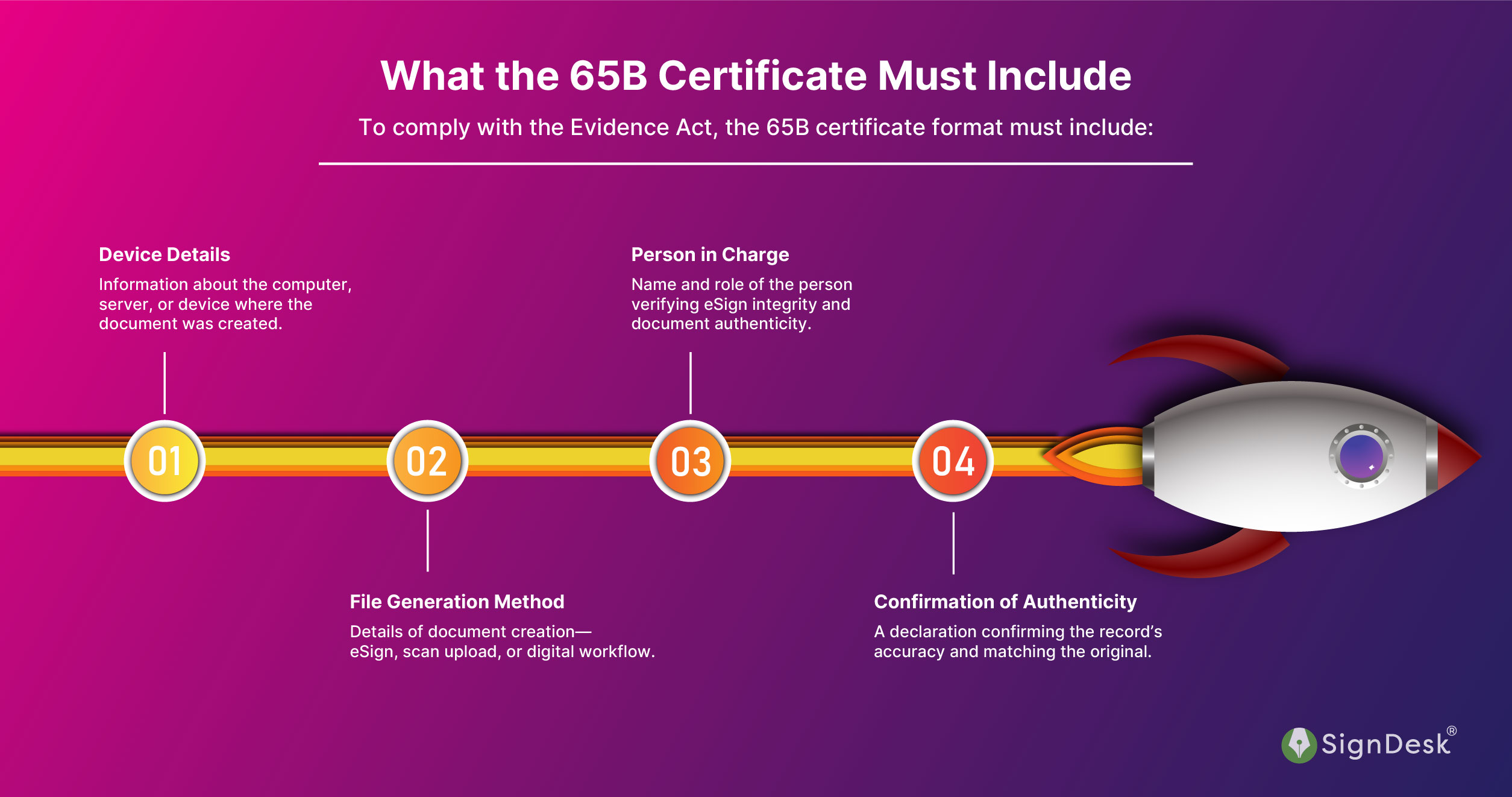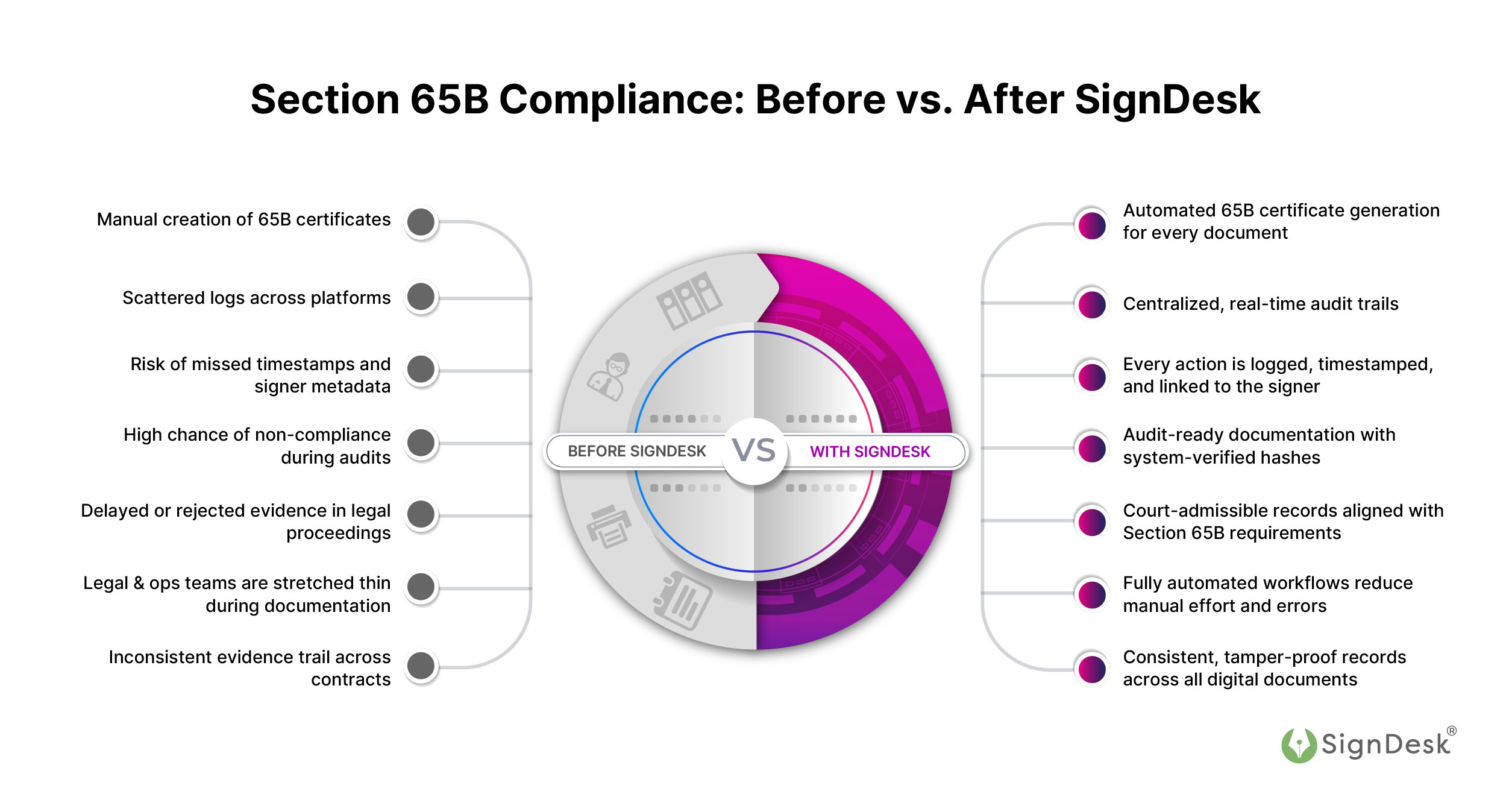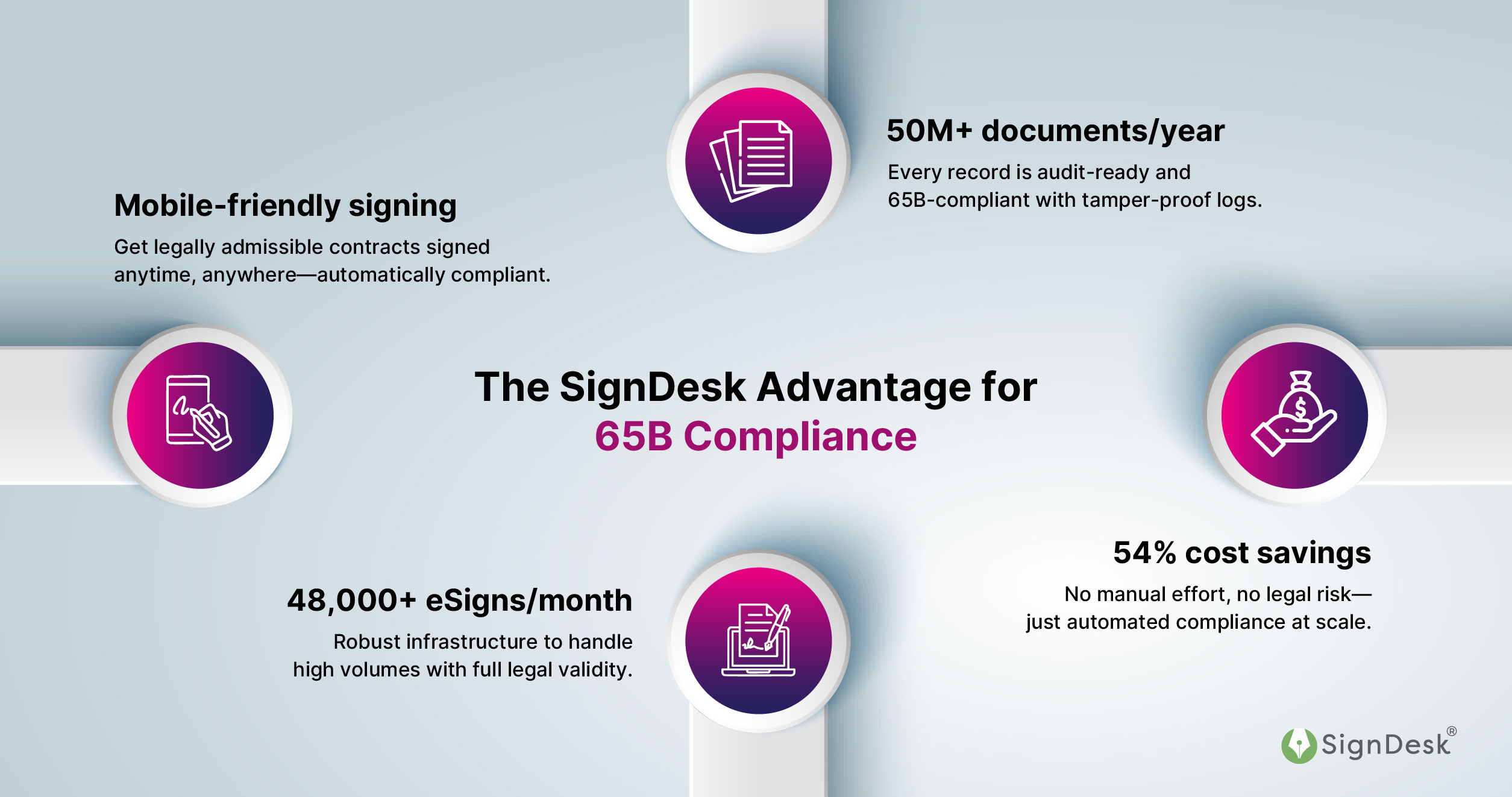Think a signed digital contract is admissible in court? Think again. The 65B Evidence Act might be the compliance key you’re overlooking. Under the section 65B of Indian Evidence Act, digital contracts are inadmissible without a proper certificate.
BFSI, logistics, and lending sectors depend on digital document compliance. They rely on enforceable contracts, onboarding forms, and submitted evidence. Failing to comply with legal requirements can cause various consequences. They include lost revenue, damaged reputation, and compromised legal standing.
SignDesk, trusted by over 3,000 businesses, automates digital workflows to comply with Section 65 B. It enables legally recognized documentation processes. This guide breaks down the 65B Evidence Act. It shows how SignDesk automates every step of digital record-keeping compliance.
Section 65B of Indian Evidence Act Compliance: Is Your Business Court-Ready?
Section 65B of Indian Evidence Act, 1872, was introduced through the IT Act, 2000. Both the IT Act and Evidence Act address the electronic evidence admissibility in legal proceedings.
According to Section 65B(1):
“Any information contained in an electronic record… which is printed on paper, stored, recorded or copied… shall be deemed to be also a document, if the conditions mentioned in this section are satisfied.”
In simple terms, the digital documents can be treated as valid digital evidence in court.
Criteria for Legally Valid eSignatures
- There must be clear intent from the signer to accept the document.
- A verifiable record should be generated when an electronic signature is executed.
- The record must include the procedure followed by the signer to approve the document.
- The act recognizes digital files as valid digital evidence in court. The files include emails, PDFs, scanned contracts, and system logs.
eSign providers like SignDesk generate detailed audit trails. They capture all necessary information to support digital recordkeeping compliance.
Applicability in Various Industries & Domains
- Section 65B applies to all digital records—including eContracts, onboarding forms, eKYC documents, transaction logs, and communication trails.
- With over 85% of businesses using electronic contracts and 70% of BFSI firms relying on digital onboarding, legal admissibility of electronic records is now a compliance priority.
- Indian Evidence Act 65B is essential for dispute resolution, regulatory compliance, and audit readiness. More applicable for the sectors that handle large volumes of digital agreements.
- If the industries fail to comply, it can result in contracts being ruled inadmissible, which can impact revenue recovery, fraud investigations, and legal defense.
The 65B Certificate: Your Key to Legally Enforceable Digital Documents
A 65B certificate serves as a self-declaration that the digital document was generated, stored, and retrieved in a lawful manner.
What the 65B Certificate Must Include
To comply with the Evidence Act, the 65B certificate format must include:

|
Device Details
|
Information about the computer, server, or device where the document was created.
|
|
File Generation Method
|
Details of document creation—eSign, scan upload, or digital workflow.
|
|
Person in Charge
|
Name and role of the person verifying eSign integrity and document authenticity.
|
|
Confirmation
of Authenticity
|
A declaration confirming the record’s accuracy and matching the original.
|
Section 65B of Indian Evidence Act in Action: Legal Cases & Supreme Court Observations
The Supreme Court has mandated that eSign and digital proof must meet 65B certificate requirements for electronic evidence admissibility.
→ In Anvar P.V. vs. P.K. Basheer (2014) case, the Court ruled that Section 65B is mandatory for evidence submission in digital format. Producing digital files without certification is insufficient.
→ Later, in Arjun Panditrao Khotkar vs. Kailash Kushanrao Gorantyal (2020) case, the Court reaffirmed this requirement, stressing that non-compliance can lead to outright rejection of evidence.
→ For businesses relying on digital contracts and eSign workflows,even a properly executed eContract can be dismissed in court if the supporting 65B certificate is missing.
To ensure legal enforceability, businesses must adopt Section 65B compliant automated legal documentation processes like SignDesk. SignDesk simplifies this process by automating record creation and generating ready-to-submit 65B Certificates.
Challenges Faced by Businesses in Complying with Section 65B
In a digital-first economy, not being 65B compliant means risking the enforceability of every digital contract you sign. Still, many businesses struggle to comply with Section 65B of Evidence Act.
- Manual Certificate Generation is Cumbersome
Creating 65B certificates manually is time-consuming, error-prone, and often neglected. Legal teams must track device IDs, log generation methods, signatories, and timestamps for every document they process.
- Lack of Awareness Within Internal Teams
Over 60% of operations and legal professionals are unaware of the mandatory nature of the 65B certification. As a result, businesses assume that a signed PDF is enough, only to discover that their evidence won’t stand in court.
- Inconsistent Tech Systems Create Gaps in Record-Keeping
Disparate platforms for signing, storing, and retrieving contracts lead to fragmented digital trails. Without centralized, evidence management systems, businesses struggle to produce audit-ready evidence when needed.
- High Risk During Audits or Legal Disputes
One missed 65B certificate can derail your entire case. During audits or legal disputes, the lack of 65B compliant documentation can delay settlements, lead to contractual losses, or even result in revenue recovery failures.
How SignDesk Helps Ensure 65B Compliance for Business Contracts?
Leading digital automation platforms, such as SignDesk, automate 65B compliance, helping enterprises avoid costly oversights and stay legally protected.
Automated Record Generation with Audit Trails
SignDesk’s suite of solutions—including eSign, Digital Stamping, eMandate, and CLM—automatically generates 65B-compliant digital records. Each document is:
- Tamper-proof, with system-generated hashes
- Timestamped, ensuring traceability of every action
- Backed by audit trails that log each step of the document’s lifecycle
These electronic records contain the who, what, when, and how, making them ready for legal scrutiny, audits, and evidence submission.
Every document event—creation, signing, storage—is logged and preserved in real-time, ensuring compliance without manual intervention.
Section 65B of Indian Evidence Act Compliance: Before vs. After SignDesk

|
⚠️ Before SignDesk
|
✅ With SignDesk
|
|
Manual creation of 65B certificates
|
Automated 65B certificate generation for every document
|
|
Scattered logs across platforms
|
Centralized, real-time audit trails
|
|
Risk of missed timestamps and signer metadata
|
Every action is logged, timestamped, and linked to the signer
|
|
High chance of non-compliance during audits
|
Audit-ready documentation with system-verified hashes
|
|
Delayed or rejected evidence in legal proceedings
|
Court-admissible records aligned with Section 65B requirements
|
|
Legal & ops teams are stretched thin during documentation
|
Fully automated workflows reduce manual effort and errors
|
|
Inconsistent evidence trail across contracts
|
Consistent, tamper-proof records across all digital documents
|
Why Businesses Choose SignDesk for 65B Compliance?
- No More Manual Certificates
SignDesk generates all necessary audit logs and metadata. Our evidence management system significantly reduces human error and legal exposure.
✅ Experience 88% fewer errors—switch to automated 65B compliance with SignDesk.
|
|
Our automation platform is designed with Section 65B certificate requirements in mind. No extra tools or steps.
✅ Boost audit efficiency by up to 80% with fully automated compliance.
|
- Plug-and-Play Integration
SignDesk seamlessly integrates into your existing workflows and systems, ensuring a smooth adoption across departments.
✅ Ensure 100% digital recordkeeping compliance all-in-one platform.
|
- Trusted By Industry Leaders
NBFCs, lenders, healthtech, and digital media brands rely on SignDesk to digitize documentation and ensure legal compliance.
✅ Join 3,000+ businesses already securing their workflows with SignDesk. |
The SignDesk Advantage for 65B Compliance

|
50M+ documents/year
|
Every record is audit-ready and 65B-compliant with tamper-proof logs.
|
|
54% cost savings
|
No manual effort, no legal risk—just automated compliance at scale.
|
|
48,000+ eSigns/month
|
Robust infrastructure to handle high volumes with full legal validity.
|
|
Mobile-friendly signing
|
Get legally admissible contracts signed anytime, anywhere—automatically compliant.
|
Real-World Impact of Indian Evidence Act 65B
Thousands of BFSI, NBFC, healthcare, and digital platforms trust SignDesk to digitize and legally safeguard contracts. Learn from real facts.
💼 Client Case Study: Upstox
Upstox needed to scale fast, but their legacy eSign tool was costly and slow.
With SignDesk’s tailored solution, they completed over 40,000 eSignatures in one month. It reduced turnaround time by 90% and ensured Section 65B compliance across all documentation.
Result: Faster onboarding, 65B compliant documentation, and accelerated growth.
|
SignDesk: Your Partner for Seamless 65B Certificate Compliance
In a rapidly digitizing regulatory environment, organizations can no longer ignore the legal enforceability of electronic records. Section 65B is not just a legal clause—it’s a business imperative for risk mitigation and compliance assurance.
With SignDesk, enterprises get more than just digital document workflows. They gain court-admissible, 65B-compliant digital evidence, backed by robust security and automation.
Automate 65B Certificates in Minutes